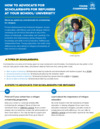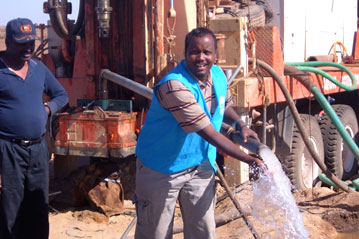UNHCR optimistic about meeting water needs of refugees in Ethiopia
UNHCR has always faced difficulties ensuring that refugees in eastern Ethiopia have enough water, but is optimistic that new projects will solve the problem.
ADDIS ABABA, Ethiopia, April 2 (UNHCR) - Over the past two decades, UNHCR has helped more than 600,000 Somali refugees in the eastern lowlands of Ethiopia. Providing them with enough water has always been a problem, with the UN refugee agency facing funding shortfalls, meagre and difficult to access underground reserves, and competition from locals for the scarce resource.
That's as true today as it was in 1991, when Somalia started disintegrating after the fall of the Siad Barre regime and people began fleeing. Most of the refugees eventually returned home, with just 16,000 remaining in Kebribeyah camp. But renewed conflict in Somalia has led to fresh influxes, prompting UNHCR to open the Aw Barre and Shedder camps in 2007 and 2008 respectively.
Under UNHCR's emergency guidelines, a person needs at least seven litres a day to survive and 20 litres a day to ensure their well-being and good health. Currently, that minimum standard of 20 litres is not being met in any of the three camps, but UNHCR believes that projects now under way should ensure that this target is reached and that access to water outlets is improved.
To meet the needs of Kebribeyah, the former Hartisheik camp and local communities, UNHCR in 2004 opened a pipeline to transport water from the well watered Jarar Valley, some 20 kilometres away.
But, as UNHCR Representative in Ethiopia Moses Okello noted, "Even this huge project does not guarantee an adequate supply of water to every family in the camp. Technical problems, and the high cost of managing the system, mean occasional failure to meet the minimum daily standard of water."
To resolve this problem, the UN refugee agency and the Ethiopian Electric Power Corporation have been working to connect the Jara Valley water supply system to the national electricity grid, which will make it cheaper to power the system than using fuel-guzzling generators. Okello believes this will solve many of the problems related to running the facility.
Meanwhile, to meet daily needs in the Aw Barre and Shedder camps, UNHCR had to truck large quantities of water from a nearby town, drill boreholes and construct a distribution network to ensure that refugees did not have to go far to get access to water.
Okello said that thanks to special funds made available for water and sanitation projects by UN High Commissioner for Refugees António Guterres, "We have been drilling and interconnecting half a dozen boreholes in the two camps. So far we have managed to provide a daily average of 12 litres per person in the two camps."
It is a work in progress. But Okello said he was optimistic that the minimum standard per person of 20 litres a day would be achieved in all three camps once the various water projects had been completed.
Somali refugee Rahma Mohammed Jamale, who fled to Ethiopia to escape conflict in Mogadishu, was one of the first residents of Shedder camp when it opened in May last year. She said it was initially tough finding enough water for herself and her six children.
"We had only two water points for a whole zone and that meant queuing up for hours to get a jerry can of water," she said, adding that the situation was much better but more work was still needed to increase the water supply for the camp's 6,600 refugees and Ethiopians living nearby.
Jamale said the improved water situation meant that children in the camp were spending more time in school and less time lining up for water. "But for this positive development to be sustained, it is up to us refugees to guard the system against misuse," she added.
By Kisut Gebre Egziabher in Addis Ababa, Ethiopia
Related news and stories
Thousands of newly arrived Somali refugees in Ethiopia relocated to new settlement
Samira's Story
Drought brings life-threatening food shortages for refugees in Ethiopia
100,000 new Somali refugees arrive in Ethiopia in the past month, UN and partners are calling for urgent funding
UNHCR teams and partners rush assistance to some 100,000 newly arrived Somali refugees in hard-to-reach area of Ethiopia
As the Horn of Africa drought enters a sixth failed rainy season, UNHCR calls for urgent assistance
-

How to advocate for scholarships for refugees at your school or university
2022 Stand up, speak out, and advocate for scholarships for refugees -

Evaluation of the caring for refugees with non-communicable diseases project
31 Dec 2021 This evaluation (full report) assesses the relevance, coherence, effectiveness, efficiency, impact and sustainability of a capacity-building project, entitled "Caring for Refugees with Non-communicable diseases Project". The project aimed to improve the quality of non-communicable diseases care for refugees in UNHCR's care. The findings of the evaluation will be used to support learning and accountability; to guide programme practices to improve non-communicable diseases care in refugee operations; and to document lessons learned from implementation and field practice. Attachments: Executive Summary and Management Response (.zip) -

Evaluation of UNHCR's Child Protection Programming 2017-2019
31 Dec 2021 This evaluation reviewed the United Nations High Commissioner for Refugees' child protection response in terms of its leadership role, strategies and programme performance with the purpose of informing the future of both UNHCR's child protection strategy and the implementation of UNHCR child protection programming. Attachments: Management Response Child Protection evaluation (.pdf) -

ES/2021/09 Evaluation of the Somos Panas Colombia Communication Campaign
31 Dec 2021 UNHCR in Colombia developed the Somos Panas ("We Are Buddies") Campaign to discourage expressions of xenophobia and promote empathy and solidarity towards Venezuelans to the benefit of society. This evaluation report evaluated the entire campaign and provides recommendations to improve actions during the next campaign cycle. Attachments: ES/2020/01 Executive Summary, Spanish version and Management Response (.zip) -

ES/2021/10 Evaluation of the project "Saving Maternal and Newborn Lives in Refugee Situations" in Cameroon, Chad and Niger.
31 Dec 2021 The United Nations High Commissioner for Refugees (UNHCR) commissioned this evaluation for the purpose of accountability and learning to inform future similar interventions. It examines the relevance, effectiveness and sustainability of the UNHCR and Bill and Melinda Gates Foundation (BMGF) project: "Saving maternal and newborn lives in refugee situations", implemented in three refugee operations in Chad, Niger and Cameroon between April 2018 and December 2019. Attachments: UNHCR Evaluation Management Response (.pdf) -

ES/2021/11 Mid-Term Process Evaluation of the IKEA Foundation Livelihoods and Energy Projects Among Somali Refugees and Host Communities in Ethiopia
31 Dec 2021 This decentralised mid-term process evaluation of Phase 3 (2019-21) of the IKEA Foundation- funded livelihoods and energy investment among the Somali refugees and host community was commissioned by the UNHCR Ethiopia/Melkadida sub-office (SOMEL). The purpose of the evaluation was to gauge the follow-up on baseline recommendations and assess the progress made toward creating sustainable livelihoods and fostering economic inclusion for refugees and their hosts in this region. Attachments: UNHCR Evaluation Management Response (.pdf) -

Evaluation Service - COVID-19 Evaluative Evidence Brief No 1
28 Dec 2021 To support organizational learning, UNHCR's Evaluation Service has commissioned an Evaluative Synthesis of UNHCR's adaptation and response to the COVID-19 pandemic. The purpose of the synthesis is to provide robust and timely evidence to UNHCR on how effectively the organisation has adapted to COVID-19 and to highlight areas of strength as well as the challenges emerging from across our evaluations. -

UNHCR regrets loss of life in the Aegean Sea, with at least 31 dead and more missing
28 Dec 2021 -

Amid surge in arrivals from Venezuela, UNHCR steps up response in the north of Chile
23 Dec 2021

